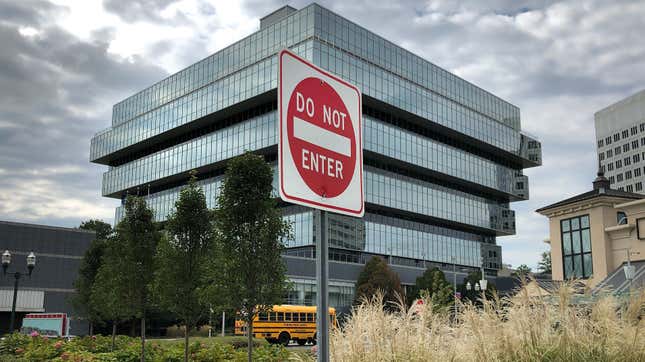
The “Empire of Pain” and the family that profited from it scored a sick joke of a settlement with the Department of Justice on Wednesday, evading accountability for their role in the nationwide opioid epidemic.
The manufacturer of the synthetic opioid OxyContin, Purdue Pharma, agreed to pay $8 billion in a settlement with the DOJ over claims that its aggressive, deceptive marketing was deliberately designed to get patients hooked on the drug, even as it pretended OxyContin was totally safe. According to NPR, under the terms of the deal the company will plead guilty to three felonies—but company officials and members of the Sackler dynasty, Purdue’s owners, will get off scot-free as far as prison time is concerned.
According to the Wall Street Journal, little of that $8 billion will ever be paid. Purdue plead bankruptcy in September 2019 to avoid paying out damages in lawsuits brought by roughly 2,000 state and local governments related to the opioid epidemic. Its bankruptcy estate is worth $5 billion, including $3 billion of the Sacklers’ money.
The DOJ said that the deal wouldn’t prevent future criminal charges against current or former Purdue executives and that investigations are ongoing. But per NPR, the deal would “almost certainly derail” the state and local lawsuits, shelter the Sacklers from liability beyond the $3 billion pledged to the bankruptcy estate, and help Purdue and the Sacklers not disclose internal information to creditors in the company’s ongoing bankruptcy proceedings—like whether or not Purdue profits helped fuel the Sacklers’ other business interests. Accusations have already come out of the New York Attorney General’s office that the Sacklers may have funneled over $1 billion into bank accounts via wire transfers in an attempt to evade creditors.
OxyContin, which the company’s sales representatives aggressively pushed to doctors as non-addictive and posing a low abuse potential, generated $35 billion in revenue on its own. Purdue brought in at least $12-13 billion in profit for the Sacklers, including $4 billion between 2008 and 2016—though its unclear how much of that profit was derived directly from sales of the opioid painkiller, though OxyContin has been, by a vast margin, its highest-selling product for nearly two decades.
In the settlement, Purdue admitted that it lied to the Drug Enforcement Administration that it had an effective program in place to prevent shipments of the drug from being diverted to the black market; it also reported false information to boost the amount of OxyContin it was allowed to produce, and used health records software to drive new OxyContin prescriptions. Perdue additionally copped to having orchestrated a kickback scheme by lining doctors’ pockets to promote the drug via a speaking program.
As the Washington Post noted, the Sacklers agreed to pay out $225 million in a related settlement for demanding, as members of Purdue’s board of directors, that executives fix slumping sales in 2012. The DOJ said that Purdue sales reps complied by doubling down on marketing to “extreme, high-volume prescribers who were already writing ‘25 times as many OxyContin scripts’ as their peers.”
If approved, the settlement will transform Purdue into a public trust that will continue to manufacture opioids.
The settlement is fiercely opposed by the attorney generals of 25 states, who wrote a letter to Attorney General Bill Barr last week urging him to “avoid having special ties to an opioid company,” according to NPR. Another letter from 38 Democratic members of Congress reads: “If the only practical consequence of your Department’s investigation is that a handful of billionaires are made slightly less rich, we fear that the American people will lose faith in the ability of the Department to provide accountability and equal justice under the law.”
“We are further concerned by the ongoing discrepancy between the ‘justice’ billionaires receive versus the countless people of color whose lives have been ruined by the way the federal government penalizes drug use,” the Democrats added. “The federal prison population has risen nearly 800% since 1980 in large part due to the proliferation of mandatory minimum sentences for nonviolent drug offenses that have had a profound and disproportionate impact on Black and Latino communities. Meanwhile, a settlement like the one reportedly being considered by your Department would allow a group of people who deliberately designed and marketed an addictive drug and caused the deaths of thousands of Americans to get off scot-free once again.”
The Democratic members of Congress also noted that the DOJ had let Purdue off the hook by slapping it with a fine of just $645 million for illegal marketing practices in 2007, after which the criminal conduct continued.
At the time, per the Journal, the Sacklers discussed how they could foresee themselves losing all their money if the right lawsuit hit:
A week after those guilty pleas, Jonathan Sackler emailed two other Sacklers and a longtime financial adviser, saying that an investment banker once told him, “your family is already rich, the one thing you don’t want to do is to become poor,” according to Justice Department filings.
David Sackler replied: “[W]hat do you think is going on in all of these courtrooms right now? We’re rich? For how long? Until which suits get through to the family?”